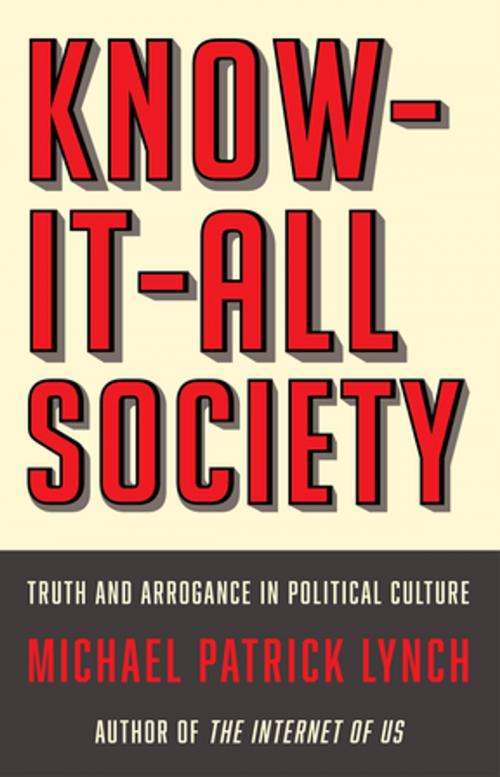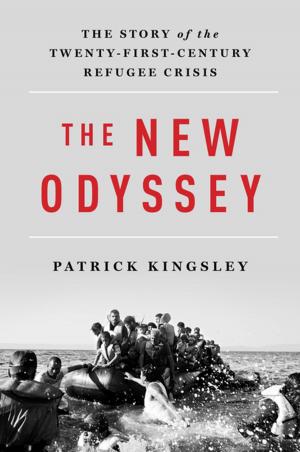Know-It-All Society: Truth and Arrogance in Political Culture
Nonfiction, Religion & Spirituality, Philosophy| Author: | Michael P. Lynch | ISBN: | 9781631493621 |
| Publisher: | Liveright | Publication: | August 13, 2019 |
| Imprint: | Liveright | Language: | English |
| Author: | Michael P. Lynch |
| ISBN: | 9781631493621 |
| Publisher: | Liveright |
| Publication: | August 13, 2019 |
| Imprint: | Liveright |
| Language: | English |
The “philosopher of truth” (Jill Lepore, The New Yorker) returns with a clear-eyed and timely critique of our culture’s narcissistic obsession with thinking that “we” know and “they” don’t.
Taking stock of our fragmented political landscape, Michael Patrick Lynch delivers a trenchant philosophical take on digital culture and its tendency to make us into dogmatic know-it-alls. The internet—where most shared news stories are not even read by the person posting them—has contributed to the rampant spread of “intellectual arrogance.” In this culture, we have come to think that we have nothing to learn from one another; we are rewarded for emotional outrage over reflective thought; and we glorify a defensive rejection of those different from us.
Interweaving the works of classic philosophers such as Hannah Arendt and Bertrand Russell and imposing them on a cybernetic future they could not have possibly even imagined, Lynch delves deeply into three core ideas that explain how we’ve gotten to the way we are:
• our natural tendency to be overconfident in our knowledge;
• the tribal politics that feed off our tendency;
• and the way the outrage factory of social media spreads those politics of arrogance and blind conviction.
In addition to identifying an ascendant “know-it-all-ism” in our culture, Lynch offers practical solutions for how we might start reversing this dangerous trend—from rejecting the banality of emoticons that rarely reveal insight to embracing the tenets of Socrates, who exemplified the humility of admitting how little we often know about the world, to the importance of dialogue if we want to know more. With bracing and deeply original analysis, Lynch holds a mirror up to American culture to reveal that the sources of our fragmentation start with our attitudes toward truth. Ultimately, Know-It-All Society makes a powerful new argument for the indispensable value of truth and humility in democracy.
The “philosopher of truth” (Jill Lepore, The New Yorker) returns with a clear-eyed and timely critique of our culture’s narcissistic obsession with thinking that “we” know and “they” don’t.
Taking stock of our fragmented political landscape, Michael Patrick Lynch delivers a trenchant philosophical take on digital culture and its tendency to make us into dogmatic know-it-alls. The internet—where most shared news stories are not even read by the person posting them—has contributed to the rampant spread of “intellectual arrogance.” In this culture, we have come to think that we have nothing to learn from one another; we are rewarded for emotional outrage over reflective thought; and we glorify a defensive rejection of those different from us.
Interweaving the works of classic philosophers such as Hannah Arendt and Bertrand Russell and imposing them on a cybernetic future they could not have possibly even imagined, Lynch delves deeply into three core ideas that explain how we’ve gotten to the way we are:
• our natural tendency to be overconfident in our knowledge;
• the tribal politics that feed off our tendency;
• and the way the outrage factory of social media spreads those politics of arrogance and blind conviction.
In addition to identifying an ascendant “know-it-all-ism” in our culture, Lynch offers practical solutions for how we might start reversing this dangerous trend—from rejecting the banality of emoticons that rarely reveal insight to embracing the tenets of Socrates, who exemplified the humility of admitting how little we often know about the world, to the importance of dialogue if we want to know more. With bracing and deeply original analysis, Lynch holds a mirror up to American culture to reveal that the sources of our fragmentation start with our attitudes toward truth. Ultimately, Know-It-All Society makes a powerful new argument for the indispensable value of truth and humility in democracy.















